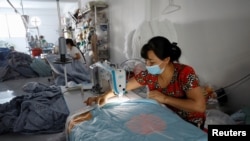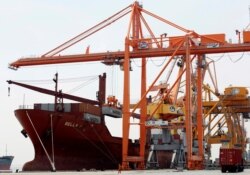Communist Vietnam is one of the only nations in the world run by a workers’ party, but even its eye-popping success at crushing COVID-19 did not stop the pandemic from leaving nearly a million citizens out of work.
Roughly 900,000 people are now unemployed, with another 18 million underemployed, according to the state General Statistics Office data for the first half of 2020. The record numbers underline how the pandemic is hurting even nations like Vietnam. It is the most populous nation in the world to report zero COVID-19 deaths, and it is one of the only economies that will grow this year. Even with those two relative successes, however, Vietnam has to contend with record unemployment, due in large part to the shrinking of demand for its products from nations worse hit by the disease.
The toll is most stark in the cities. In the second quarter of 2020, urban unemployment hit a decade high of 4.46%, a figure that was 3.09% in the same period two years prior. The figure also marks a major turnaround from the first quarter of 2020, when the International Labor Organization office in Hanoi said employment levels “remained unaffected by the crisis” of COVID-19.
“The complicated and unpredictable COVID-19 pandemic caused growth in most industries and sectors to slow down,” the General Statistics Office said in a statement. “Unemployment and underemployment have increased greatly.”
Such jobless numbers are almost unheard of in Vietnam, where the norm has historically been sky-high trade growth, fueling the din of factories and construction day and night.
Labor unions
In response to the COVID-19 emergency, the state has introduced a $2.7 billion relief fund that includes aid to workers, who are already undergoing broader disruptions in the labor market. Vietnam is in the process of approving labor unions independent of the Communist Party, as part of a pledge in its new European Union trade deal, as well as retooling the work force for the digital economy.
“Employees of all fields need to be well trained,” Nguyen Hanh Phuc, the general secretary of the National Assembly, said. “We need to encourage enterprises to invest in staff training and enhance competitiveness among employees.”
As much as Vietnam has tried to keep its own house in order, crushing COVID-19 before it could spiral out of control, it is not immune to the pandemic’s destruction outside its borders. The Southeast Asian nation relies heavily on exports to drive its economy, particularly to the United States and the EU, but consumer demand in both regions dropped in the wake of the outbreak.
However there is still more investment flowing to Vietnam compared with most other nations. For example, though COVID-19 “put the brakes” on business mergers and acquisitions (M&A) globally, Vietnam is the exception and deals are “anticipated to flourish,” PwC consulting firm said.
“We have noticed that the appetite for M&A activities has not dampened,” Ong Tiong Hooi, the transaction services partner at PwC Vietnam, said. “It is understandable that local companies are now taking the lead as they are based in-country.”
In another example, more Vietnamese are flying domestically now than in the same period last year, part of a campaign to replace the loss of foreign tourism with local travelers.
Hotels like the Anam on Vietnam’s south-central coast say they are increasing their hygiene measures to make locals feel safe to travel.
“Now that Covid-19 restrictions have well and truly eased in Vietnam we welcome families, looking for a safe place to stay over the summer vacation, to our resort,” Pham Van Hien, the founder of Anam, said.







